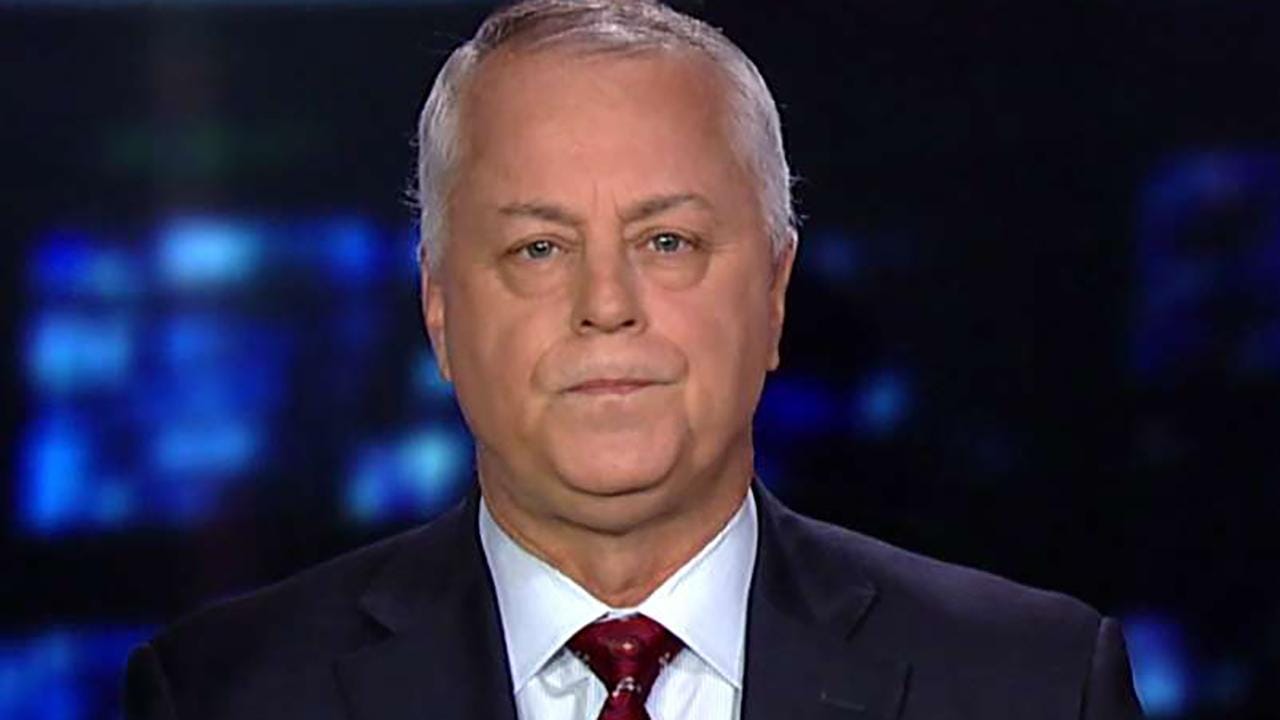A Terrible Pick for a Big Pentagon Job
A retired general and Fox News commentator, Anthony Tata doesn’t have what it takes to handle policy for DOD. Oh, and he’s a kook.
Two weeks after Senate voted not to convict President Trump on the impeachment charges brought by the House of Representatives, he fired the undersecretary of defense for policy, John Rood. The military aid to Ukraine that figured so prominently in Trump’s impeachment could, under U.S. law, only be released if the person serving in that Pentagon role—abbreviated as “USD(P)”—determines that the Ukrainian government has taken the proper actions to combat corruption. Apparently, Rood’s sin was that he had performed his legal duty and given his honest assessment and hence cleared the release of the aid by approving of the Ukrainian government’s anti-corruption campaign.
Two months later, the president nominated Anthony Tata, a retired Army brigadier general, to succeed Rood. This is a terrible and very troubling nomination. To see why, let’s first discuss the job and then discuss the man.
The USD(P) is one of the most important roles in the U.S. national security apparatus. The officeholder has to handle arms control diplomacy; the promotion of human rights; mid- and long-range military policy planning; coordinating with treaty allies—especially NATO; budgeting; counternarcotics policy; the oversight of special operations; helping with the development and implementation of the National Defense Strategy; planning for potential future conflicts; and much more besides. It is an extraordinarily difficult job, one that demands intelligence, experience, stamina, and wisdom.
The USD(P) is a civilian position, and the roster of past incumbents since the position was created in the late 1970s reads like a list of many of both parties’ best and brightest in national security, including:
Fred Iklé, who held the position under Reagan, was a lifetime civilian, an MIT professor, and a veteran of Nixon and Ford administrations.
Paul Wolfowitz, one of the greatest intellects of the Republican party national security intelligentsia with a long résumé in government and academia. Long before Iraq’s invasion of Kuwait, Wolfowitz had ordered developing a plan for a potential war with Iraq, which significantly contributed to the U.S. military’s success in the Desert Storm.
Frank Wisner, a career Foreign Service Officer with a variety of national security positions in different administrations.
Eric Edelman, a career Foreign Service Officer, deputy assistant secretary of defense in the George H.W. Bush administration, and national security adviser to Vice President Dick Cheney, who remains a respected conservative national security expert. (Disclosure: He is a friend and professor of mine at Johns Hopkins University, SAIS.)
Michèle Flournoy, Obama’s first USD(P), had previously served in the Clinton administration’s DOD as a civilian and later would teach as a professor at the National Defense University. When out of government, she co-founded the Center for a New American Security. In a Biden administration, she would surely be a leading candidate for secretary of defense.
James Miller, with a career as a House Armed Services Committee staffer, think-tank scholar, and the principal deputy to Flournoy.
As you can see, former USD(P)s have tended to be been smart, professional, and largely uncontroversial individuals who have studied and practiced—and many of them taught—diplomacy, military strategy, and policy as civilians.
And now along comes Anthony Tata, who has none of the aforementioned qualifications.
Tata has never had a civilian job in national security. (Since retiring from the Army, he has, in addition to his gig on Fox News, been a school administrator and the transportation secretary for North Carolina.)
His military career ended prematurely upon forging court documents and charges of adultery against U.S. military code.
While in the Army, Tata never held any position that involved policy, strategy, or long-term planning, and his highest responsibilities were on the operation level.
By the requirements of the position and by the standards of his predecessors, Tata is simply unfit for the job.
His apparent chief qualification? He has been a bombastic, pander-to-the-base commentator on Fox News. That’s a good enough criterion in the Trump administration.
But wait, it gets worse.
Tata is a notorious bigot. And he is a conspiracy theorist.
He has deleted most of his tweets, but here are some of his greatest hits.
Example 1: On Islam
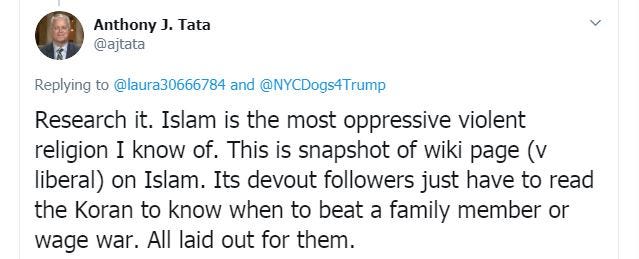
Example 2: On Obama as a Terrorist
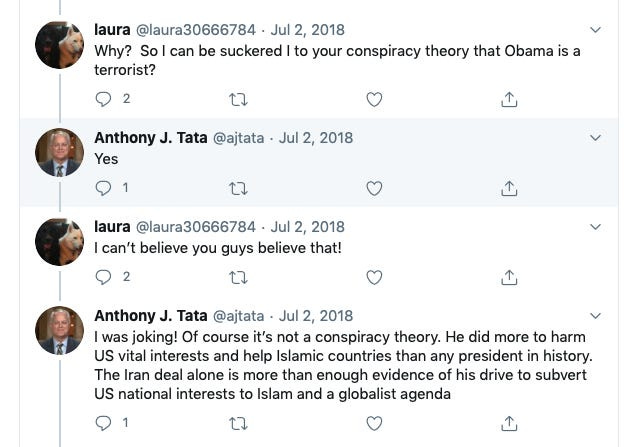
Example 3: On Obama and Islam
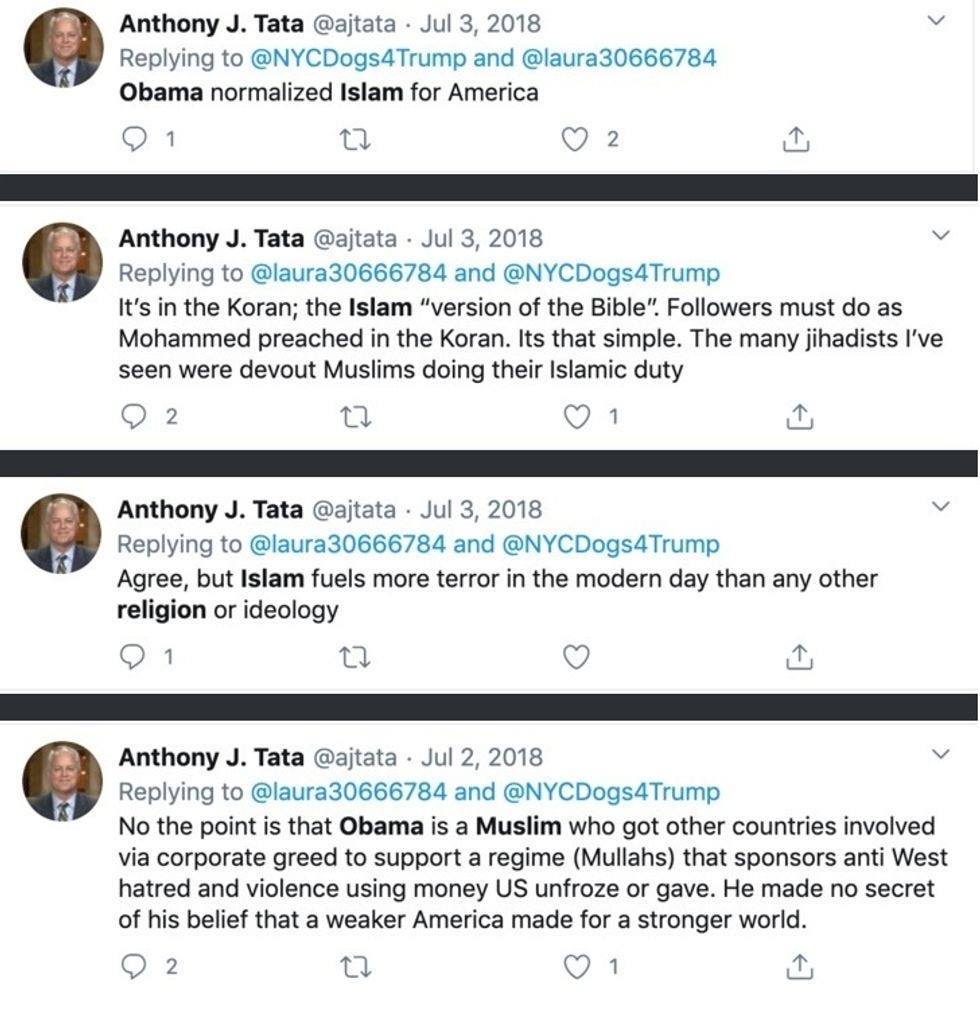
Elsewhere, Tata suggested that Obama’s nuclear deal with Iran was “sorta from [Obama’s] Islamic roots to help Iranians and the greater Islamic state crush Israel. . . . If it walks like a duck and talks like a duck, it’s probably a duck.”
Example 4: Throwing Around Charges of Treason
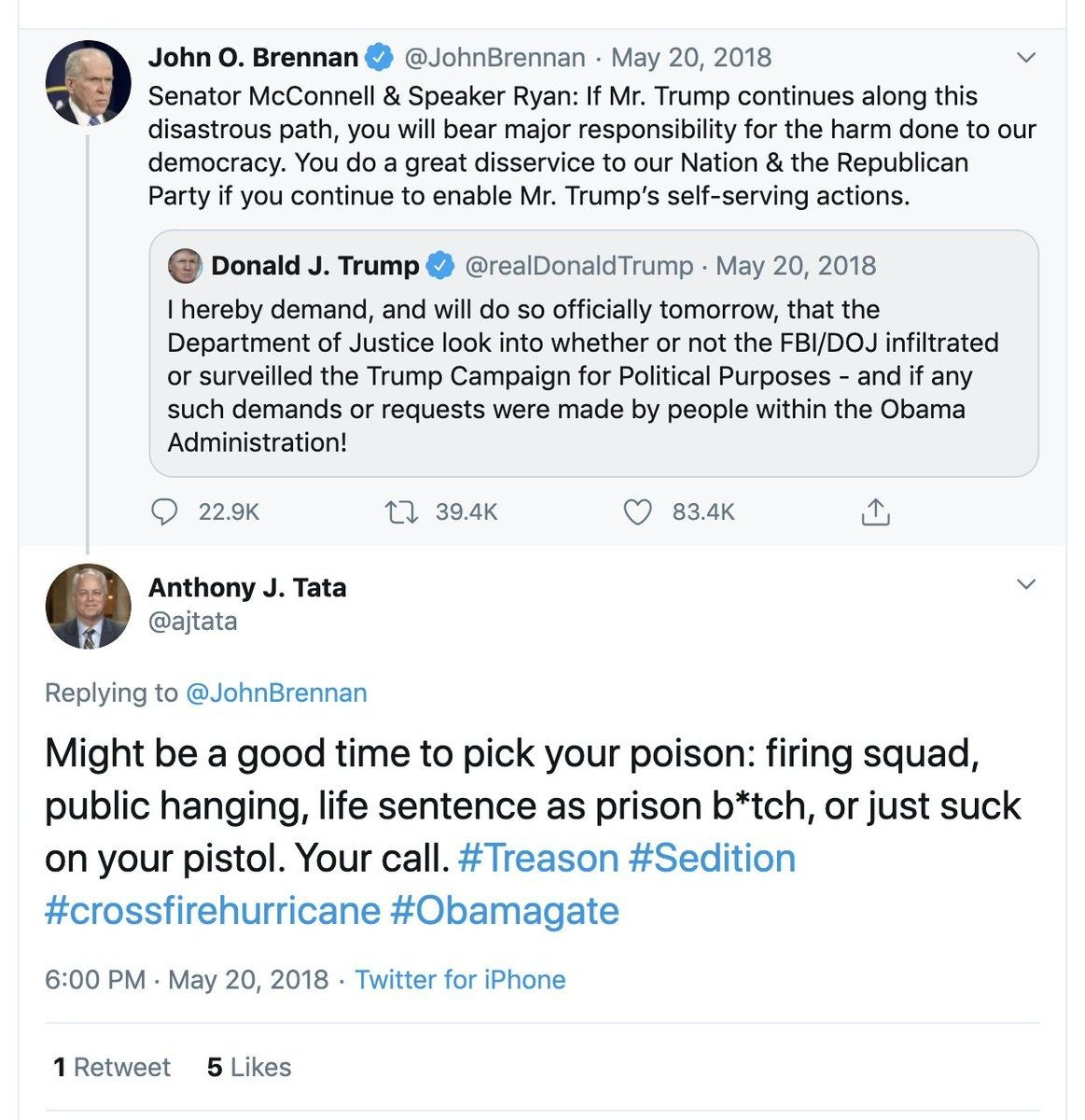
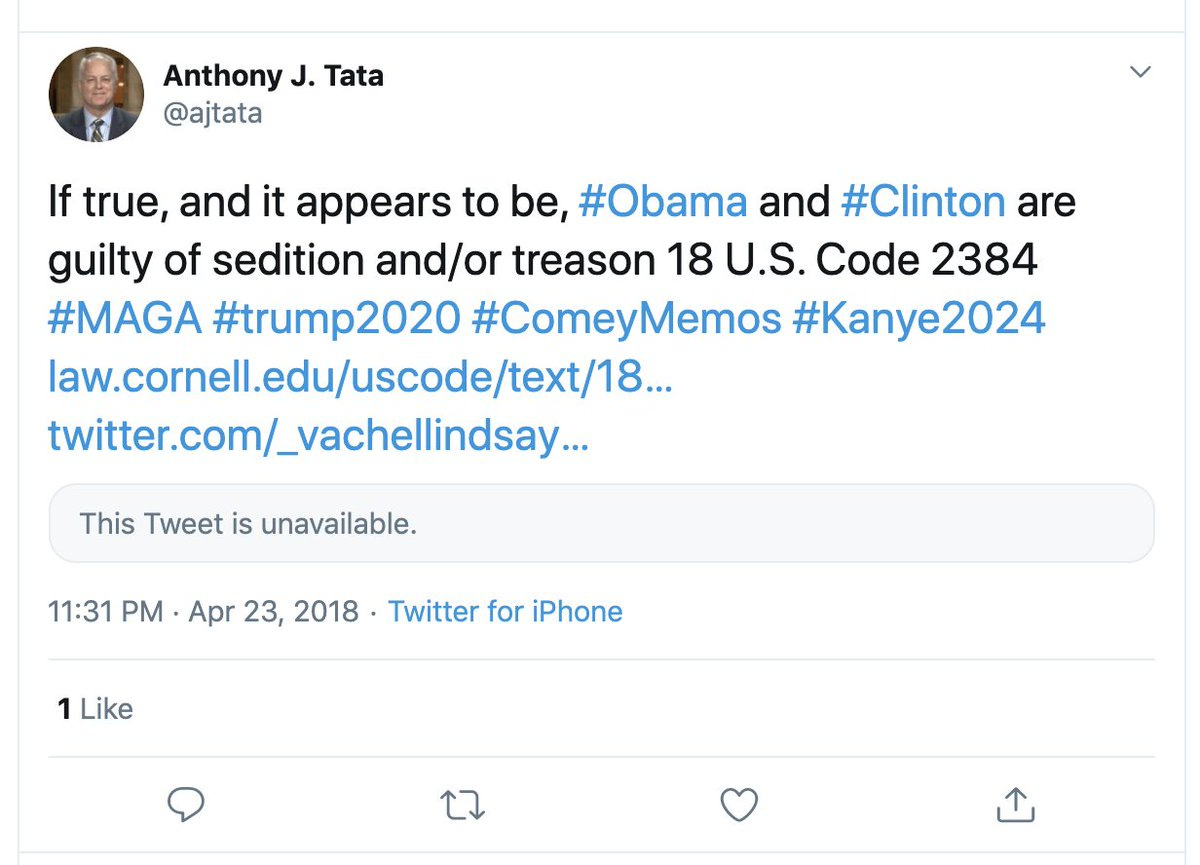
Example 5: Secret Signals and Imaginary Assassination Threats
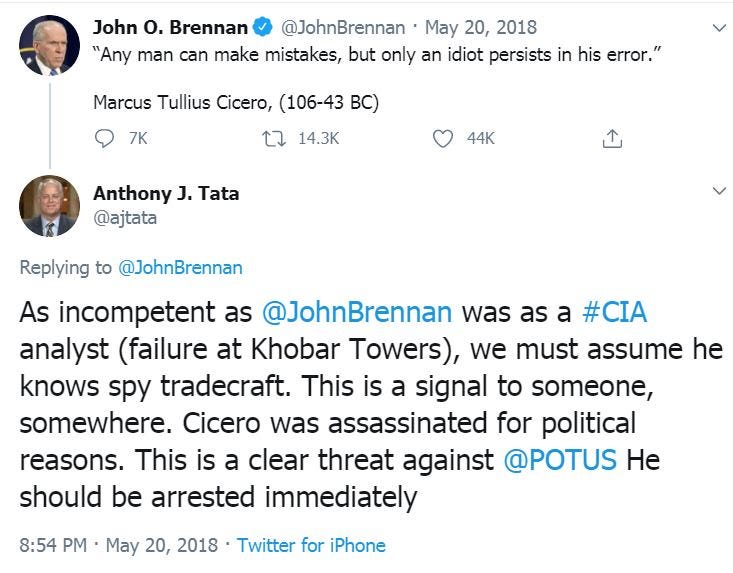
Tata has also called Rep. Maxine Waters a “vicious race baiting racist” and Speaker Nancy Pelosi a “violent extremist,” and he tweeted that Don Lemon, a black CNN anchor, was on the “the liberal plantation.”
Imagine how America’s Arab allies would feel sitting across the table from Tata for arms negotiations—which is a part of the USD(P)’s portfolio.
Another part of the portfolio is negotiating with Congress over the military budget; it is safe to say there is no goodwill on the part of Speaker Pelosi or really any Democrat for Tata.
Perhaps most importantly, however, is the effect that his appointment will have on the morale of minority troops—including Muslim servicemembers. Tata’s nomination is not only a mistake in terms of qualifications, it’s also a mistake in terms of his temperament, reason, and prudence. A man so unfit, with so many glaring disqualifications, has never been nominated to such a senior position at the Department of Defense.
Recently, senior alumni of the Department of Defense—both civilian and military—have come out against the Trump administration’s practices that are undermining the institutional strength of the department. Tata’s nomination is another threat to the department’s strength, society’s trust in the civilians at the DOD, and the military’s morale. Those leaders should once again speak out to urge the withdrawal or defeat of Tata’s nomination.


